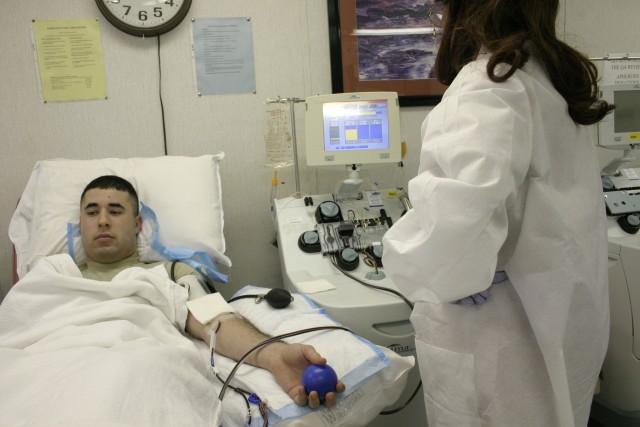
FORT BRAGG, N.C. - Blood - something flowing through all of us is in high demand all the time. More than 40 units of blood may be needed for a single injured Soldier. One donation can help a fellow Soldier wounded in action, a child with cancer and a Family member in need of heart surgery according to the Armed Services Blood Program's Web site. Besides feeling great for doing something good for fellow servicemembers and Family members, Soldiers can also earn promotion points by donating platelets at the Fort Bragg Blood Donor Center.
The BDC, located at Building 8-2809 Scott St., receives donations for whole blood, platelets and plasma. The center is open Monday through Thursday from 7:30 a.m. through 4 p.m. and Friday from 7:30 a.m. to 3 p.m. "We have a two-fold mission. Our primary mission is to collect blood products that go overseas to support our Soldiers. We're one of 21 donor centers that has that mission. Our second mission is to provide blood products for our local hospital, Womack (Army Medical Center,)" said Capt. Aleksey Casco, chief of Blood Services, Fort Bragg Blood Donor Center.
Platelets donations are completed at the center by appointment. There is a continuous need for platelet donations. "The shelf life is only five days whereas (whole) blood is 42 days. That's why we need to continue to collect them so they're available when they are needed," said Casco.
Platelet transfusions are used to improve blood clotting functions in a wide variety of patients, including those with cancer, traumatic injuries, and peri-operative bleeding.
The process for donating platelets is different from traditional whole blood donation. Because the blood can only be withdrawn and returned at a certain rate, the donation takes from an hour and a half to two hours instead of 45 minutes for a whole-blood donation. Donors are encouraged to bring a DVD movie, a favorite book or chat with fellow donors and medical staff during donation.
The donor's blood is processed through an apheresis machine that extracts only the platelets needed and returns the remaining blood components, such as red and white blood cells and plasma, to the donor. Throughout the entire process, the donor's blood fluids and cells are processed with sterile, single-use, disposable tubing, cell bags, and separation units. The donor's blood cells and fluids never touch the inside of the apheresis machine, therefore, there is no risk of blood-transmitted diseases according to the center's Web site.
Unlike a whole blood donation, where a specific amount of whole blood is withdrawn from your body, a platelet donation involves withdrawing whole blood, separating out about 10 percent of the specific platelet cells, and returning the rest of the donor's cells and blood fluids back to the donor's system. The body replaces donated platelets in about a day or two. Since platelet replacement is a quick process, a donor may donate platelets every two weeks, up to 24 times per year. After a platelet donation, one may return to giving whole blood donations, subject to medical limitations imposed by a whole blood donation.
For example, after a whole blood donation, donors must wait 57 days to donate whole blood again, giving up to six whole blood donations each year. However, after a platelet-only donation, volunteers can donate whole blood or platelets again in about two weeks.
Once a volunteer has donated platelets, he or she will receive a certificate of achievement after the first donation and every third donation thereafter. Soldiers will receive a certificate of achievement in accordance with Army Regulation 600-8-22 which can be used for promotion points. Department of the Army civilians can receive a certificate (IAW 672-20) upon request.
Before donating, make sure to have a good meal with water or juice. When whole blood, plasma and platelet donors come to the BDC, they will fill out a form and questionnaire about their health. After the staff determines if the donor is qualified to give blood by reviewing the form, testing blood and checking vitals, volunteers are taken to the designated area where they will be prepped and ready to give blood products.
The BDC isn't the only place one can give blood. Units can also sponsor blood drives. "That's our mission," said Casco. "Any unit that is going to support us, we can go to their site and assess it for adequate space and temperature."
The BDC has a mobile team that can set up at different locations.
Blood donations are a never-ending request.
"With the shelf life of whole blood and platelets, it's a continuous cycle that we have to meet. The need will continue to be there," said Casco.
To find out about how to donate blood or to sponsor a unit blood drive, call the BDC at 396-9925, 396-9895 or visit www.militaryblood.dod.mil/fortbragg/.

Social Sharing